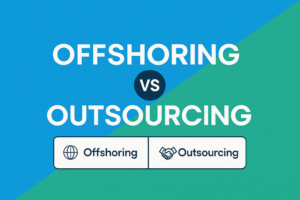When you’re bringing new employees into a small team, you need to get it right. In the early days of a company, a lot of the culture is developed out of the personalities, goals, and aspirations of the founders; adding a new personality into the mix can bring a significant change.
But it’s not just about personality and cultural fit. For small businesses and start-ups, every penny counts, and hiring virtual employees will get you far better value for money. Taking that first step towards bringing people into your team is always an exciting and worrying time, and more so if this is your first time considering hiring a remote developer or other team members.

We spend our days talking to companies in all stages of development and matching them with some of the best development talents in the world. Along the way, we’ve learned a thing or two that we think you need to know before you hire your first remote employee.
Remote Employees Are Better Value
One reason that some companies start considering a remote team, is because they think they can save money by hiring from areas of the world where salaries are lower. Newsflash: Remote workers aren’t second class citizens. They bring with them a world of value outside of salary that means no matter what you pay; you’re getting a great deal. Things like:
- Increased productivity.
- Reduced bricks & mortar costs.
- Improved employee retention (cutting recruitment costs).
- Less time lost due to sickness.
The jury really is out now on whether virtual workers are ‘worth it’. If you need more convincing, then we recommend the excellent TED talk by Nicholas Bloom where he discovered that effective remote employees work an additional day a week.
You Need a Policy
Before you hire your first remote team member, think about what you’re going to expect from them and get it written down in a remote work policy. You’ll need to consider things like core office hours, how you’re going to measure success, Data Protection, Expenses, and more. This document helps you set expectations, and gives you a starting point for ironing out any problems that might occur.
It’s What People Want
According to Global Workplace Analytics, as many as 90% of people want to be able to work from home, at least some of the time. What that means is that offering flexible working, or remote/virtual employment gives you a real edge over your competition if they’re restricting their staff search to people nearby or who are willing to relocate.
Not Everyone is Remote Ready
But, while most people want the chance to work from home, full-time remote working doesn’t suit everyone. Virtual employees need time management skills, they need to be able to motivate themselves to get on with things, and if they work in a different time zone they will need the problem-solving skills that will keep them working if they run up against a problem and there’s no one else around to brainstorm with.
How can you tell if someone is going to thrive when they work from home? A proven track record doing so is the easiest way to tell, but if they don’t have any remote experience then you’ll want to assess them for all the qualities mentioned above through scenario-based questions like ‘How do you structure your working day?’
Communication is Everything
One of the criticisms leveled against remote working is that staff miss out on ‘water cooler chat’ and that’s damaging to the company. There’s also an idea that creativity is better when people are face to face, working in Google-style open-plan offices with ball pits and omelet bars. The truth is that the world of remote work is evolving incredibly quickly, and there is now a whole raft of collaboration and communication tools out there that make working together effortless, no matter where in the world the team is located.
You can manage a distributed team using the same skills that you use for an office-based one, the only difference is that you have to factor in which technologies will support you to do so over distance. For example, a Slack channel can replace the traditional water cooler/office banter type of chat, and daily stand-ups can keep the whole team in the loop on who is doing what, and where the sticking points are.
Worried about a language barrier? Don’t be. You’ll be surprised at how many bi or multi-lingual people there are in the world. You might need to be a little more considerate to help communication; keep a glossary of euphemisms or slang, send out documents before a meeting so they can read through, or offer a backchannel to clear up questions during meetings.
Diversity Pays
By offering flexible working, you’re opening your company up to a more diverse range of voices, and that has undeniable benefits for your business. Diverse teams bring more viewpoints to any problem, and that leads to better problem-solving. Sharing skills and experience increases the effectiveness of everyone involved.
We’re not just talking about hiring people from different countries, who may come from different cultural backgrounds – although that in itself is a huge plus. Remote working helps women stay in work after they’ve had children (or fathers to take on a fair share of parental responsibility) and enables people with disabilities to compete on a level playing field.
The Future is Remote
Remote work isn’t going anywhere; that’s why you’ll see it mentioned in so many ‘Technology Trends in 2020’ articles just now. There’s been a sea change, and the tide us all to a future where remote work is the rule, not the exception. If you’d like to be part of that and hire your first virtual developer, then get in touch today and we’ll get our best (remote) people right on it.




